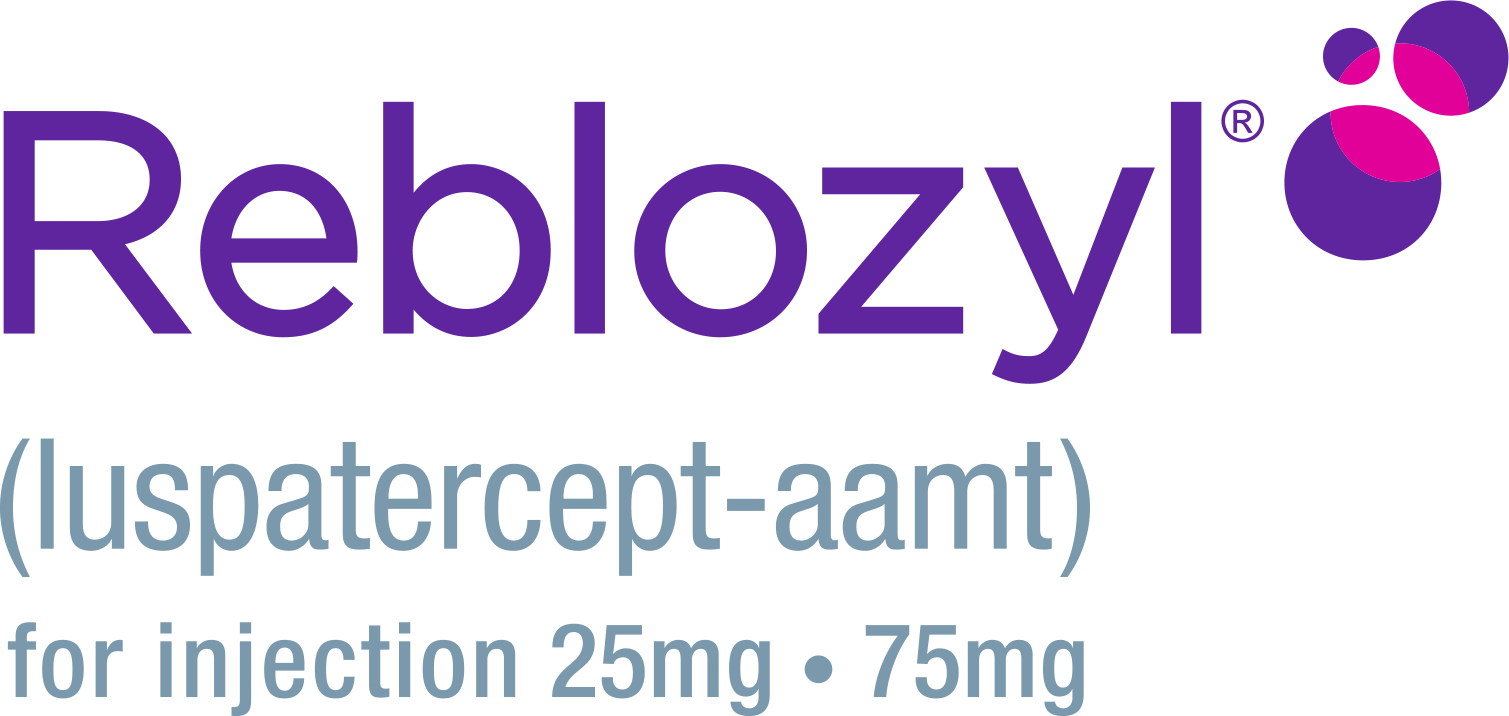| Body system/ Adverse reaction |
REBLOZYL(n=153) |
Placebo(n=76) |
||
|---|---|---|---|---|
| All Grades n (%) |
Grade 3 n (%) |
All Grades n (%) |
Grade 3 n (%) |
|
| General disorders and administration-site conditions Fatiguea,b |
63 (41) | 11 (7) | 17 (22) | 2 (3) |
| Musculoskeletal and connnective tissue disorders Musculoskeletal painb |
30 (20) | 3 (2) | 11 (14) | 0 (0) |
| Nervous system disorders Dizziness/Vertigo Headacheb Syncope/Presyncope |
28 (18) 21 (14) 8 (5) |
1 (<1) 0 (0) 5 (3) |
5 (7) 5 (7) 0 (0) |
1 (1) 0 (0) 0 (0) |
| Gastrointestinal disorders Nauseab Diarrheab |
25 (16) 25 (16) |
1 (<1) 0 (0) |
8 (11) 7 (9) |
0 (0) 0 (0) |
| Respiratory, thoracic, and mediastinal disorders Dyspneab |
20 (13) | 2 (1) | 4 (5) | 1 (1) |
| Immune system disorders Hypersensitivity reactionsb |
15 (10) | 1 (<1) | 5 (7) | 0 (0) |
| Renal and urinary disorders Renal impairmentb |
12 (8) | 3 (2) | 3 (4) | 0 (0) |
| Cardiac disorders Tachycardiab |
12 (8) | 0 (0) | 1 (1) | 0 (0) |
| Injury, poisoning, and procedural complications Injection-site reactions |
10 (7) | 0 (0) | 3 (4) | 0 (0) |
| Infections and infestations Upper respiratory tract infection Influenza/Influenza-like illness |
10 (7) 9 (6) |
1 (<1) 0 (0) |
2 (3) 2 (3) |
0 (0) 0 (0) |
PATIENT OUTCOMES: REBLOZYL SAFETY IN SECOND-LINE MDS PATIENTS
REBLOZYL offers a demonstrated safety profile1
The majority of adverse reactions with REBLOZYL were Grade 1 or 2 (mild to moderate)1
- Among the 242 patients treated with REBLOZYL, 5 (2.1%) had a fatal adverse reaction1
- Selected laboratory abnormalities that changed from Grade 0 to 1 at baseline to Grade ≥2 at any time during the studies in at least 10% of patients included creatinine clearance decreased, total bilirubin increased, and alanine aminotransferase increased1
Adverse reactions (≥5%) in patients receiving REBLOZYL with a difference between arms of >2% in MEDALIST trial through Cycle 81
aIncludes asthenic conditions. bReaction includes similar/grouped terms.
- Other clinically relevant adverse reactions reported in <5% of patients included bronchitis, urinary tract infection, and hypertension1
Important considerations while treating patients with REBLOZYL
Liver function abnormalities1
Immunogenicity1
Additional safety data
Discontinuations and dose modifications in MEDALIST1
Dose delays and reductions in MEDALIST2
Review how to dose REBLOZYL to optimize patient response
References: 1. REBLOZYL [US Prescribing Information]. Summit, NJ: Celgene Corporation; 2023. 2. Platzbecker U, Fenaux, P, Mufti GJ, et al. Assessment of dose-dependent response to luspatercept in patients with lower-risk myelodysplastic syndromes with ring sideroblasts in the phase 3 MEDALIST trial. Presented at: 25th Congress of the European Hematology Association [virtual]. June 12, 2020. Abstract EP812. 3. Fenaux P, Platzbecker U, Mufti GJ, et al. Luspatercept in patients with lower-risk myelodysplastic syndromes. N Engl J Med. 2020;382(suppl):1-37.

